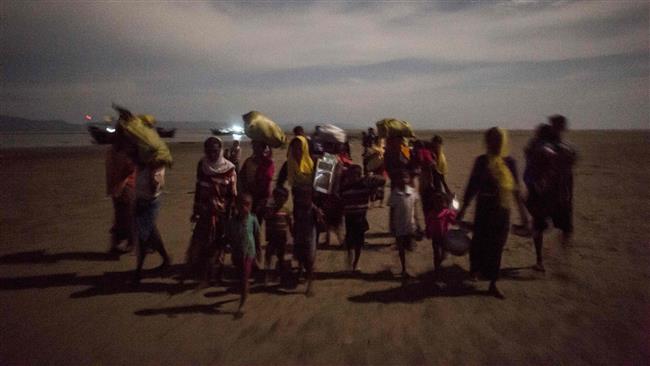
RNA - With more refugee arrivals in the already overcrowded camps that lack clean water and toilets, aid workers insist that a major health catastrophe is imminent.
Karim Elguindi, the head of UN World Food Program office in the border city of Cox’s Bazar, has described the mass inflow of exhausted refugees on Friday as “distressing.”
“There’s more and more people coming and there’s not enough space in the existing camps” to accommodate them, said Elguindi, who was touring the area after hearing a new influx was underway, according to an AP report.
“I don’t know how many Rohingya are left in Myanmar ... but there’s more on the way,” he added, underlining that many of the refugees had been traveling for five days or more without carrying food.
“These people are very vulnerable, very hungry ... they need shelter, they need water," said the WFP official.
Meanwhile, the Red Cross also reported that the refugee camps in Bangladesh were reeling on the precipice of a full-scale health disaster.
Health experts believe conditions in the grossly deficient camps are ripe for disease outbreaks such as cholera.
“The risk of there being an acute, watery diarrhea epidemic is real and serious,” an international health and sanitation expert told AFP on condition of anonymity.
“If the current situation stays the same, I guarantee it. It’s not if, it’s when,” he added.
This is while Heavy monsoon rain in the region is compounding the risk of a disease outbreak, with field doctors reporting a huge surge in cases of severe diarrhea, especially among refugee children.
The AFP report also highlights a severe shortage of healthcare staff at the camps, saying at a field clinic, a long queue of refugees waiting to see the only doctor available stretched beyond the tent into the pouring rain.
The doctor, Alamul Haque, sees more than 400 patients, including a spiraling number of children with water-borne illnesses.
The doctor, who is with Bangladeshi charity SDI, also stated, “Earlier parents were bringing one or two children with them. Now it’s three to four.”
“It’s been raining, so human waste is running everywhere. There is a high chance of a diarrhea epidemic here,” he added.
Meanwhile, new groundwater wells are rapidly being dug across the camps, which stretch along the Cox’s Bazar district bordering Myanmar.
However, there remains a serious shortage of fresh water, with the sheer scale of the disaster -- described as one of the fastest-growing refugee crises in years -- outpacing aid efforts on the ground.
On Saturday, Bangladeshi media also reported that over 2,000 Rohingya Muslims from Rakhine State have massed along Myanmar’s coast to join the refugee exodus to Bangladesh.
The exodus first erupted on August 25, when the Myanmar government unleashed a fresh military crackdown on Rakhine State.
The UN and prominent human rights groups have denounced the violence as an “ethnic cleansing” campaign against Myanmar’s minority Muslim community.
In the latest of such expressions of outrage, Iran voiced alarm over the deteriorating humanitarian conditions in Rohingya refugee camps, criticizing the international community’s inaction on the crisis.
As time goes, the problems plaguing the minority Muslim group are getting more complicated, said Foreign Ministry spokesman Bahram Qassemi, stressing that such a situation puts an even heavier responsibility on other countries and international institutions.
“Such complex and difficult circumstances could lead to one of the worst humanitarian crises in the current era,” he warned.
The Iranian official further slammed as “unacceptable” the Myanmar government’s indifference towards international calls for its military to end the violence against Rohingya Muslims.
Iran has repeatedly requested the Myanmar government to facilitate the dispatch of an Iranian humanitarian mission along with relief aid for the refugees, but it has so far let down such requests.
847/940